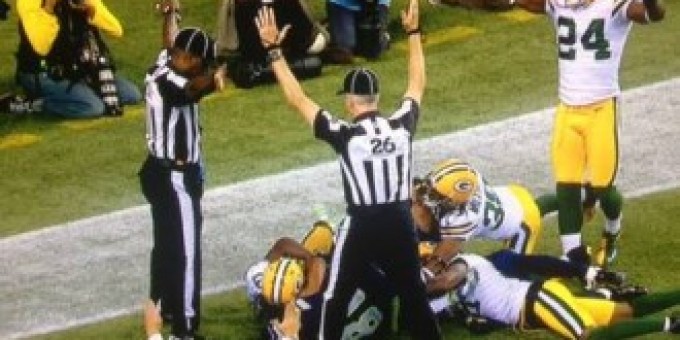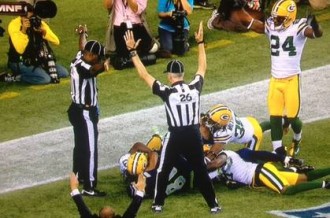
The adventure in labor relations that has marked the start of the NFL season has brought to light many larger forces in our society: the challenge of occupations that mix complexity with snap decision making and, of course, the depth of greed among the football capitalist class. But as a professional sociologist, the phenomenon that stuck me most forcefully in the NFL referee lock out is the power of social stigma.
As brought into the sociological discourse by Erving Goffman almost 50 years ago, stigma is a phenomenon in which social reactions condition a person’s entire identity. The social shame of being caught picking one’s nose is bad enough. But if somehow—perhaps by repeated incidences or maybe thanks to the conscious efforts of an enemy—that action comes to color how most others see your entire identity, then you have been stigmatized. Sometimes a characteristic beyond our control can stigmatize us. Mental illness is a severely stigmatizing condition, as are many skin diseases. Cancer used to be stigmatizing, but is less so now. Race can be stigmatizing as well.

As a die-hard football fan, I was no champion of the replacement referees, but I did see the pernicious work of stigma rearing its head. The replacement refs were clearly at the steep end of the learning curve, and yes, they blew some major calls—most notably the final, decisive touchdown in Seattle against the Green Bay Packers. But once the replacement refs had been labeled with the stigma of incompetence, fans viewed every call they made (or didn’t make) through this unforgiving lens.
But regular, seasoned officials have a storied history of blowing important calls, too. It’s not for nothing that instant replay has become a mainstay of football. As a New York Giants fan, I submit January 5, 2003 as Exhibit A. In the final play of this critical playoff game, my team lined up for the winning field goal. The long snap was botched and the holder called, “Fire,” meaning the kick wasn’t going to occur and the players should pursue an alternate play: a pass. The receiver the holder-turned-quarterback threw to was literally tackled—as clear a case of defensive holding or pass interference as you get. Even though time ran out, rules state that the game cannot end on a defensive penalty. So the Giants should have been able to re-kick. With an aching heart, I remind you: these were the playoffs, where the games are supposed to be called by the crème de la refs!
Stigma is one of the tools in the kit of social and political life. That is, stigma often serves someone’s interest. Take Presidents. In the 24/7 glare of an election campaign, all candidates are going to garble a phrase now and then, but not all candidates are going to get a reputation for Bushisms. All candidates contradict themselves on occasion, but not everyone is going to be known as a “flip-flopper” like John Kerry was. And many candidates will say insensitive things, but not all get labeled as cold-hearted plutocrats like Mitt Romney has been. Clearly, the stigma has been seeded by the opposition in these cases—the ground was fertile for the planting.
In the case of the NFL, the replacement officials were ripe for tarnishing thanks to their inexperience at a very tough job under an intense spotlight. But they were also pawns a the labor struggle between the owners and the regular referees playing out in the national media. This is instructive: it’s important to pay attention to the wider social context when assessing someone who may be stigmatized. It’s also important to consider more objective data, if possible.
So, if we want to be mad at those folks who donned the zebra stripes, we should be angry that they were union-busting scabs, not that they missed a pass interference penalty or two. Better still, Packer fans (and the rest of us), should direct their wrath through the protective glass of the stadia owners’ boxes. For another thing to know about social stigma is that wealth and power often act as protective forces to shield individuals from the deleterious effects of such labeling. It’s almost never the plutocrats who get stigmatized—witness the reelection of Louisiana Senator David Vitter after a prostitution scandal. It’s always the homeless, the ill, and the poor saps trying to ref a game who have to live with the burden of stigma.

Comments 3
Kyle Green — October 3, 2012
Great post. I've also been fascinated by the way the refs were treated as heroes on their return to the field (standing ovations from the fans and players and analysts talking about a renewed confidence in the product and game). I am guessing the refs will not be able to remain perched atop that pedestal for long.
uggen — October 23, 2012
Given the degree of stigma, I sometimes wonder whether replacement players or refs engage in a form of secondary deviance -- e.g., errors or bad career moves that result, in part, from internalizing a strong, public, negative label. To the extent the label (e.g., as a "scab" or incompetent, or ...) really shapes identity, sociologists like (Edwin) Lemert would expect secondary deviance as a "means of defense, attack or adjustment" to the problems created by the societal reaction. It could all blow over for those who retained some degree of anonymity, but a few of the refs were really thrown into the spotlight this fall...
The Personal is Sociological » The Editors' Desk — November 5, 2013
[…] his deepest and most revealing, I think, is in his application of Erving Goffman’s notions of stigma and impression management. Without much fanfare or unnecessary abstraction, Lindner uses these […]